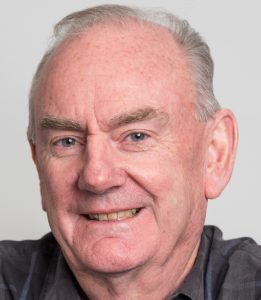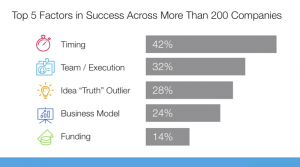
Bill T. Goss (the man behind idealab the US’s oldest Incubator) has founded a lot of start-ups in his time.
 But after nearly 20 years in operation he started to get curious about exactly why only some of his (or all) VC funded projects succeed (less than 5%) while most others fail or struggle – since they are all evaluated the same way at the beginning of their journeys.
But after nearly 20 years in operation he started to get curious about exactly why only some of his (or all) VC funded projects succeed (less than 5%) while most others fail or struggle – since they are all evaluated the same way at the beginning of their journeys.
He asked himself was it:
• The ‘idea’ behind the concept?
• The ‘business model’ … how they proposed to earn revenue?
• Or was it a ‘rock star’ management team?
So in 2015 the extraordinaire innovator and successful businessman gathered data from hundreds of start-ups (100 of his own and 100 from other VC outfits) and ranked each company on five key Success Factors – see table below:
Surprisingly he found one factor stood out from all the others — TIMING .
But is that a real surprise?
Not really, last weeks WOL blog posed the question: Is innovation an Art or a Science?
It seems to me that gauging Timing is extremely subjective whilst all the other 4 Success Factors can be evaluated with a reasonable degree of objectivity.
One of the perennial problems with innovation (particularly Disruptive Innovation) is that it is impossible to foresee if a particular innovation will actually become truly disruptive.
Certainly some new ventures may hold the promise of completely changing delivery of a product or service, or even a whole industry. But they can only be described as Perceived Disruptive Innovations since they must be successfully introduced before that judgement can actually be made – see my PhD thesis title.
I guess the real answer is “Innovation is art built on top of a scientific base” but as discussed last week it remains a mystery … at least till after the event
Speaking academically (in a post Newtonian world) most knowledge falls into the category of belief (or mystery) until it is understood scientifically.
 Dr Andrew M Connery is the Director of Innovation at CTPM Australasia and has been active online since 2001.
Dr Andrew M Connery is the Director of Innovation at CTPM Australasia and has been active online since 2001.
Andrew completed his PhD at the UOW’s Sydney Business School in 2015 his doctoral dissertation ‘Overcoming Barriers to the Introduction of Perceived Disruptive Innovations in to Rigid Efficient Systems’.
